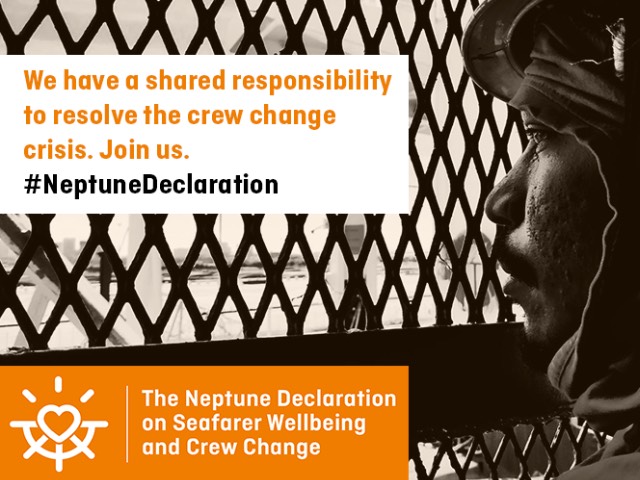300+ companies and organisations sign the Neptune Declaration on Seafarer Wellbeing and Crew Change
GAC has joined more than 300 shipping and human rights leaders in signing the Neptune Declaration on Seafarer Wellbeing and Crew Change in a worldwide call to action to end the unprecedented crew change crisis caused by COVID-19. Other signatories include A.P. Møller – Mærsk, BP, BW, Cargill, COSCO, DOW, Euronav, MISC Group, NYK, Rio Tinto, Shell, Trafigura, Unilever and Vale.
Stranded
Hundreds of thousands of seafarers from across the globe have been left stranded working aboard ships beyond the expiry of their initial contracts and are unable to be relieved since the outbreak of the coronavirus pandemic. Fatigue after long periods at sea has significant consequences on the physical and mental wellbeing of seafarers. It also increases the risk of maritime incidents and environmental disasters, and poses a threat to the integrity of maritime supply chains, which carry 90% of global trade.
Despite significant efforts by international organisations, unions, companies and some governments to resolve this untenable crew change crisis we are starting to see the situation getting worse as governments bring in more travel bans in response to the new strains of the Covid-19 virus. A number of key issues leave this critical situation unresolved: national authorities around the world continue to see crew changes and international travel as a COVID-19 risk; high-quality health protocols are not being consistently implemented by ship operators; and the disruption of international air travel has reduced the number of flights between traditional crew change hubs and major seafaring nations.
Call to action
GAC joins more than 300 companies and organisations in recognising their shared responsibility across the entire maritime value chain, and beyond, to ensure that the crew change crisis is resolved as soon as possible. They have signed the Neptune Declaration on Seafarer Wellbeing and Crew Change that defines four main actions to facilitate crew changes and keep global supply chains functioning:
- Recognise seafarers as key workers and give them priority access to Covid-19 vaccines
- Establish and implement gold standard health protocols based on existing best practice
- Increase collaboration between ship operators and charterers to facilitate crew changes
- Ensure air connectivity between key maritime hubs for seafarers
Pledge
“Seafarers have worked throughout the coronavirus pandemic to keep the world supplied with food, energy and other vital goods,” says GAC Group President Bengt Ekstrand. “By a cruel twist of fate, they have become its victims, stranded on their ships, unable to disembark and return to their homes. This cannot be allowed to continue. That is why GAC has signed the Neptune Declaration calling for action to resolve this unprecedented humanitarian crisis and pledge to press for change to improve their situation and continue our work to facilitate crew changes around the world.”
The Neptune Declaration has been developed by a taskforce of stakeholders from across the maritime value chain including A. M. Nomikos, Cargill, Dorian LPG, GasLog, Global Maritime Forum, International Chamber of Shipping, International Maritime Employers’ Council, International Transport Workers’ Federation, ONE, Philippine Transmarine Carriers, Sustainable Shipping Initiative, Synergy Group, V. Group, and World Economic Forum
FACT SHEET
According to the latest Manpower Report from ICS and BIMCO, the worldwide population of seafarers serving on internationally trading merchant ships is estimated at 1,647,500 seafarers, of which 774,000 are officers and 873,500 are ratings.
China, the Philippines, Indonesia, the Russian Federation and Ukraine are estimated to be the five largest supply countries for all seafarers (officers and ratings).
During normal circumstances, ICS estimates around 100,000 seafarers are rotated every month, with 50,000 disembarking and 50,000 embarking ships to comply with relevant international maritime regulations, governing safe working hours and crew welfare, so that they can continue to transport global trade safely.
At the height of the crew change crisis in the autumn of 2020, the UN International Maritime Organisation estimated that around 400.000 seafarers were on their ships beyond the expiry of their contract, while another 400.000 seafarers were unable to get to work.
Fatigue after long periods at sea has significant consequences on the physical and mental wellbeing of these seafarers. Physically, seafarers can often work 7 days a week and 10-12 hours shifts to man ships, performing tasks that require constant professional attention. They also typically work between four and six months on ships, followed by a period of leave. However, extensive periods at sea, in some cases, over 17 months, have become routine as a result of Covid-19 and increase the risk of accidents onboard.
On 1 December 2020 United Nations General Assembly adopted a resolution calling for all countries around the world to designate seafarers as key workers and implement crew change protocols.
Progress on addressing the crew change crisis has been made through significant efforts by individual companies, international organisations, industry associations, labour unions, NGOs and some governments, but the situation is still not resolved as many seafarers remain stranded on vessels beyond the expiry of their contracts.
With the new COVID-19 mutations that spread more easily, some governments are introducing stricter measures on travelers in general and on seafarers and crew changes specifically, which can lead to a return to the untenable situation we saw last year.
Inability to crew change poses a significant threat to the integrity of maritime supply chains. Around 90% of global trade is transported by commercial shipping, which moves the world’s food, energy and raw materials, as well as manufactured goods and components – including vital medical supplies and many products sold in supermarkets.









































